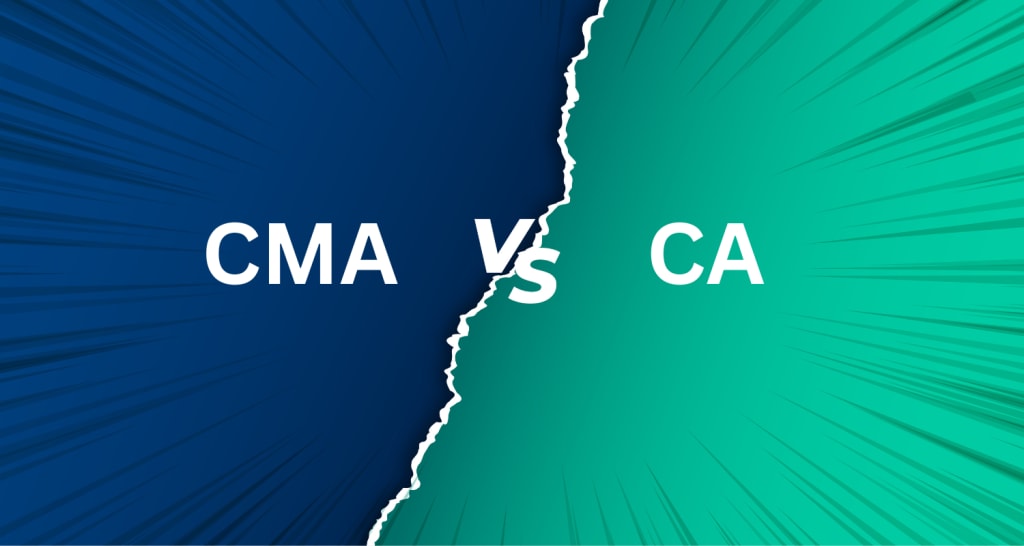CA vs CMA: Choosing the Right Path for Your Career
CA vs CMA

When deciding on a career in finance and accounting, two prominent options often come to mind: Chartered Accountant (CA) and Cost and Management Accountant (CMA). Both qualifications offer rewarding careers, but they cater to different aspects of the financial world. In this article, we will delve into the key differences and similarities between CA and CMA to help you make an informed decision. Our focus keyword is "CMA vs CA," which will be used strategically throughout the content.
What is a Chartered Accountant (CA)?
Overview of CA
A Chartered Accountant (CA) is a professional who specializes in accounting, auditing, taxation, and financial management. CAs are recognized for their expertise in providing valuable insights into financial health, ensuring compliance with regulations, and advising on financial strategies.
Qualifications and Exams for CA
To become a CA, candidates must complete a rigorous series of examinations and practical training. The Institute of Chartered Accountants of India (ICAI) conducts these exams. The process typically includes:
CA Foundation - The entry-level examination.
CA Intermediate - A more advanced set of exams.
CA Final - The final stage of the CA qualification process.
In addition to passing these exams, candidates must also complete a period of articleship, gaining practical experience under a practicing CA.
Career Opportunities for CA
CAs have a broad range of career opportunities available to them, including roles in:
- Auditing and Assurance
- Taxation
- Financial Advisory
- Corporate Finance
- Consulting
CAs are often employed by accounting firms, corporations, and government agencies.
What is a Cost and Management Accountant (CMA)?
Overview of CMA
A Cost and Management Accountant (CMA) focuses on cost management, financial planning, and strategic decision-making. CMAs play a critical role in analyzing and controlling costs to enhance an organization's profitability.
Qualifications and Exams for CMA
The Institute of Cost Accountants of India (ICAI) is responsible for the CMA qualification process. Aspiring CMAs must pass the following exams:
CMA Foundation - The initial stage of the CMA qualification.
CMA Intermediate - A series of exams covering more advanced topics.
CMA Final - The final set of exams required for certification.
Practical training is also a vital component of the CMA qualification process, providing candidates with real-world experience in cost and management accounting.
Career Opportunities for CMA
CMAs have diverse career options, including roles in:
- Cost Management
- Budgeting and Forecasting
- Financial Analysis
- Performance Management
- Risk Management
CMAs are valuable assets to manufacturing companies, service industries, and various other sectors that focus on cost control and efficiency.
Key Differences Between CA and CMA
Focus and Specialization
- CA: Emphasizes auditing, taxation, and financial management.
- CMA: Focuses on cost management, financial planning, and strategic decision-making.
Qualification Process
- CA: Requires passing CA Foundation, Intermediate, and Final exams, along with completing articleship.
- CMA: Involves passing CMA Foundation, Intermediate, and Final exams, along with practical training.
Career Paths
- CA: Opportunities in auditing, taxation, corporate finance, and consulting.
- CMA: Roles in cost management, budgeting, financial analysis, and performance management.
Similarities Between CA and CMA
Professional Recognition
Both CA and CMA qualifications are highly respected and recognized in the finance and accounting industry. They signify a high level of expertise and commitment to the profession.
Rigorous Training
Both qualifications require candidates to undergo extensive training and pass challenging exams. This ensures that professionals are well-prepared to handle complex financial and management tasks.
Making the Right Choice: CA vs CMA
Consider Your Career Goals
When deciding between CA and CMA, it's essential to consider your career goals and interests. If you are passionate about auditing, taxation, and financial management, a CA might be the right choice for you. On the other hand, if you are more interested in cost management, strategic planning, and financial analysis, a CMA could be a better fit.
Evaluate the Qualification Process
Consider the qualification process for each path. The CA route involves a longer articleship period, while the CMA qualification focuses more on practical training in cost management. Assess which path aligns better with your learning style and career aspirations.
Job Market and Opportunities
Research the job market and opportunities available for both qualifications. While CAs often find roles in auditing and taxation firms, CMAs are in demand in industries that prioritize cost control and efficiency. Understanding the job market can help you make an informed decision.
What is the primary difference between CA and CMA?
The primary difference lies in their focus areas. CAs specialize in auditing, taxation, and financial management, while CMAs focus on cost management, financial planning, and strategic decision-making.
Which qualification is more challenging, CA or CMA?
Both qualifications are challenging in their own right, requiring extensive study and practical training. The difficulty level may vary depending on an individual's strengths and interests.
Can I pursue both CA and CMA qualifications?
Yes, many professionals choose to pursue both qualifications to enhance their career prospects and expertise in multiple areas of finance and accounting.
What are the career prospects for CAs and CMAs?
CAs often work in auditing, taxation, corporate finance, and consulting, while CMAs find roles in cost management, budgeting, financial analysis, and performance management.
How long does it take to become a CA or CMA?
The time required to become a CA or CMA varies. Typically, the CA qualification process takes around 4-5 years, including exams and articleship. The CMA qualification process may take around 3-4 years, including exams and practical training.
Choosing between CA and CMA depends on your career aspirations, interests, and the type of work you enjoy. Both qualifications offer rewarding careers with excellent growth prospects. By understanding the key differences and similarities between CA and CMA, you can make an informed decision that aligns with your professional goals. Remember, whether you choose CA or CMA, both paths lead to a successful career in finance and accounting.
About the Creator
Toplad
Toplad is a trusted online learning platform that offers Complete Course Videos exclusively for the CMA, CS and CA exam preparation.
Enjoyed the story? Support the Creator.
Subscribe for free to receive all their stories in your feed. You could also pledge your support or give them a one-off tip, letting them know you appreciate their work.






Comments
There are no comments for this story
Be the first to respond and start the conversation.